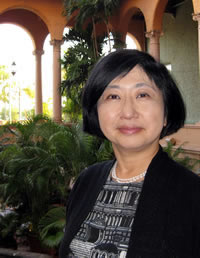 |
Joseph Alkana, Ph.D. (Texas, 1990)
Professor Emeritus
Fields: 19th-century American literature, Jewish literature.
Author, The Social Self: Nineteenth-Century Psychology and the Writings of Hawthorne, Howells, and William James (1996). Co-editor, Cohesion and Dissent in America (1994).
|
 |
Manette Ansay
Professor Emeritus
New York Times best-selling author A. Manette Ansay grew up in Wisconsin among 67 cousins and over 200 second cousins. Her novels include Vinegar Hill, an Oprah Book Club Selection, and Midnight Champagne, a finalist for the National Book Critics Circle Award, as well as Sister, River Angel, Blue Water and Good Things I Wish You. She has also published a memoir, Limbo, and a short story collection, Read This and Tell Me What It Says, which won the AWP Short Fiction Series Prize. Honors and Awards include the Chancellor’s Award from the University of Wisconsin/Whitewater, the Stillwater Society Presidential Award for Achievement from the University of Maine, the Banta Prize from the Wisconsin Librarians Association, two Great Lakes Book Awards from the Great Lakes Booksellers Association, a National Endowment for the Arts Grant, and Pushcart Prize for Fiction. Ansay lives and writes in Boulder, Colorado, where she enjoys working with developing writers of all ages and interests.
|
 |
Ronald B. Newman, Ph.D. (Michigan, 1972)
Professor Emeritus
Fields: Composition, rhetorical theory, Victorian literature.
Author, The Prentice-Hall Diagnostic Test for Writers (1980), The Rinehart Workbook(1988, 2nd ed. 1990), The HBJ Composition Workbook (1992).
Editor, The Life: The Folk Poetry of the Black Hustler (1976).
|
 |
Frank Palmeri, Ph.D. (Columbia, 1981)
Professor of English and Cooper Fellow in the Humanities, Emeritus
Email
Frank Palmeri has published on comparative literary studies of the 18th and 19th centuries; satire in narrative and graphic forms; conjectural history and the history of social thought; animal studies; and the novels of Thomas Pynchon. In addition to being comparative (primarily involving British, French, German, and American), his work is interdisciplinary—calling on the critical methods of history, visual studies, and philosophy. At the University of Miami, he held courtesy appointments in the departments of Art History, Philosophy, and Classics.
His most recent book, State of Nature, Stages of Society: Enlightenment Conjectural History and the Origins of Modern Social Thought (2016), is included in Columbia University Press’s Series in Political Thought/Political History: https://cup.columbia.edu/book/state-of-nature-stages-of-society/9780231175166
He has published two other authored books—Satire in Narrative: Petronius, Swift, Gibbon, Melville, Pynchon (1990) and Satire, History, Novel: Narrative Forms 1665-1815 (2003). He has edited two volumes: Critical Essays on Jonathan Swift (1993) and Humans and Other Animals in 18th Century Britain: Hybridity, Representation, Ethics(2006). His essays have appeared in journals such as ELH: English Literary History, Comparative Literature, Criticism, Postmodern Studies, SEL: Studies in English Literature, 1500-1900, and Journal of Critical Animal Studies, as well as numerous edited volumes.
He is currently working on two book projects: Disciplining Radical Satire: Narrative, Caricature, and the Political Imaginary in Nineteenth-Century England; and Animals, Violence ,and Metamorphosis in Early Modern Visual Culture. He is a regular contributor to History News Network.
|
 |
Sandra P. Paquet, Ph.D. (Connecticut, 1977)
Professor Emerita
Professor Sandra Pouchet Paquet teaches Caribbean literature and African-American literature. She is the author of The Novels of George Lamming (1982); Caribbean Autobiography (2002), andco-editor of Music, Memory, Resistance: Calypso and the Caribbean Literary Imagination (2007). She has published widely in Caribbean literature in the leading journals in the field and is the editor of Anthurium: A Caribbean Studies Journal. Dr. Paquet's active research interests include the areas of women's studies, diaspora studies, and autobiography.
|
 |
Mihoko Suzuki, PhD (Yale, 1982)
Professor of English and Cooper Fellow in the Humanities, Emerita
Founding Director, Center for the Humanities
Email: msuzuki@miami.edu
Mihoko Suzuki earned her AB in an interdisciplinary major, History and Literature, in the College Scholar Program at Cornell University, and her PhD in Comparative Literature at Yale University. Her scholarship currently focuses on Renaissance and early modern literature and culture, English and European, with an emphasis on gender, politics, and authorship. She has also published on the classical tradition and the relationship between Japan and Western Europe during the early modern period. She is the author of two books. Metamorphoses of Helen: Authority, Difference, and the Epic examines Helen of Troy as a figure of difference for literary and political authority in classical and Renaissance epic. Subordinate Subjects: Gender, the Political Nation, and Literary Form in England, 1588-1688 argues for the importance of the contribution of women and non-aristocratic men to the political conversation leading up to, during, and after the tumultuous years of the English Revolution. In addition, she has edited or coedited six books, most on gender in the early modern period (Debating Gender in Early Modern England, 1500-1700; The Rule of Women in Early Modern Europe), but also on contemporary feminist criticism and theory (Diversifying the Discourse). She has also edited the writings of and about Mary Carleton and Elizabeth Cellier, notable (and notorious) women writers in seventeenth-century England, as well as coedited a 4-volume collection of printed and manuscript texts, Women’s Political Writings, 1610-1725 and volume 3 of the 10-volume Palgrave History of British Women’s Writing (1610-90). She has published articles in Classical and Modern Literature, Comparative Literature Studies, Literature Compass, The Seventeenth Century, Theatre Journal, Tulsa Studies in Women's Literature, and Women's Writing, among others, and in essay collections, such as A History of Early Modern Women's Writing (2017); The Bloomsbury Handbook of 21st Century Feminist Theory (2019); A Cultural History of Education in the Renaissance (1450–1650) (2020); Routledge History of Women in Early Modern Europe (2021); A Companion to the Global Renaissance (2021); Historicizing Life Writing and Ego-Documents in Early Modern Europe (2022); Margaret Cavendish: An Interdisciplinary Perspective (2022); and The Oxford Handbook of Early Modern Women’s Writing in English, 1540–1680 (2022).
Her most recent book, Antigone’s Example: Early Modern Women's Political Writings in Times of Civil War from Christine de Pizan to Helen Maria Williams, aims to revise the history of political thought, which has heretofore focused almost exclusively on formal treatises written by such thinkers as Machiavelli, Hobbes, and Locke, by examining the works of early modern women writing in various genres. To this end, she examines women’s political writings during the seventeenth-century civil wars in England (1640-1660) and France (1648-53), but also extending backward to civil war contexts in the early fifteenth century and forward to the aftermath of the French Revolution in the early nineteenth century. She has been awarded research fellowships for this project from the Folger Shakespeare Library and the New York Public Library; during fall 2016, she presented three public lectures drawn from this project at Smith College as Ruth and Clarence Kennedy Professor of Renaissance Studies.
Her current book projects concern early modern women writers and epic; and women’s manuscript writings as political discourse, for which she has been awarded the Paul Oskar Kristeller Fellowship from the Renaissance Society of America and the David Walker Memorial Fellowship in Early Modern History from the Bodleian Library.
Suzuki coedited, along with her University of Miami colleagues, Anne J. Cruz and Mary Lindemann, six volumes of Early Modern Women: An Interdisciplinary Journal (2011-17), which was awarded the 2013 Voyager Award (for excellence in a journal covering the period 1500–1800) from the MLA Council of Editors of Learned Journals. With Ann Rosalind Jones and Jyotsna Singh, she coedited Transculturalisms, 1400-1700, a book series for Ashgate/Routledge, which published 29 titles. She now coedits New Transculturalisms, 1400-1800 for Palgrave Macmillan. She served for many years as review editor for Clio: A Journal of Literature, History, and the Philosophy of History.
She has been an active member of various professional organizations, serving as President of the interdisciplinary Society for the Study of Early Modern Women and the International Margaret Cavendish Society (from which she received the 2017 Sylvia Bowerbank Award), and as member of the Executive Council of the Sixteenth Century Studies Society and the International Spenser Society. For the Modern Language Association, she served on the Advisory Committee of PMLA, and as Chair of the selection committees for the William Riley Parker Prize (for the best article in PMLA) and the MLA First Book Prize; she also served on the Executive Committee of the division on Seventeenth-Century English Literature and as President of the Women’s Caucus on the Modern Languages. She is currently the Discipline Representative for Women and Gender for the Renaissance Society of America and one of the articles coeditors of Renaissance Quarterly.
To view selected articles by Mihoko Suzuki, please visit her Scholarly Repository: http://works.bepress.com/mihoko_suzuki/
|
 |
Lindsey Tucker, Ph.D. (Delaware, 1981)
Professor Emerita
Fields: Contemporary American, African American and British literature, postmodern theory, women’s and gender studies, film theory, African New World cultures.
Publications: Stephen and Bloom and Life’s Feast: Alimentary Symbolism in James Joyce’s “Ulysses” (1984; Textual Escap(e)ades: Mobility, Maternity and Textuality in Contemporary Fiction by Women (1994); editor, Critical Essays on Iris Murdoch (1994); editor, Critical Essays on Angela Carter (1998)
Recently Completed Project: The Spaces of Conjure: Fiction, Ethnography and Diaspora Time
|










